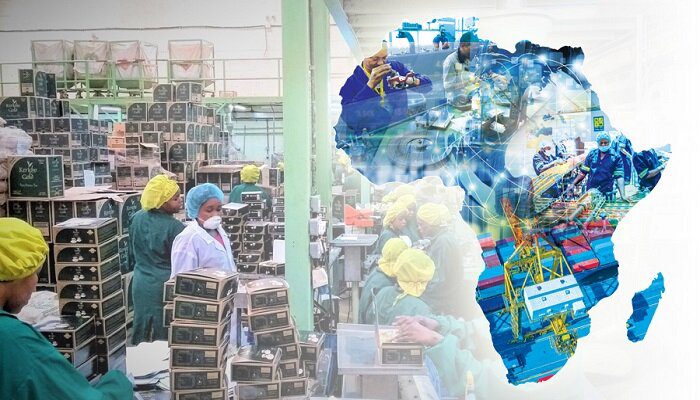Academics as well as those concerned from the private sector and development finance institutions have gone on to reach a consensus that African countries should make use of the African Continental Free Trade Area- AfCFT and enhance trade within the continent, all of which will go on to play a crucial role when it comes to supporting small and medium enterprises- SMEs as well as promoting industrialization across Africa.
It is well to be noted that the 18th Africa Economic Conference featured a plenary session in the name of Fostering African Industrialization Through Linkages of Small and Medium Enterprises to Global Value Chains.
The panel had in it Prof. Dirk Willem te Velde, Principal Research Fellow and Director of International Economic Development with the Overseas Development Institute, Prof. Banji Oyelaran-Oyeyinka, Senior Special Advisor to the President of the African Development Bank Group, Mr. Marcio Cruz, IFC Principal Economist, Economic and Market Research Department, Ms. Aurelia Patrizia Calabro, UNIDO’s Representative and Director of Regional Office Hub in Ethiopia and Special Representative to the African Union for United Nations Industrial Development Org., and Engineer Yusuf Binji, Managing Director and Chief Executive Officer of BUA Cement Plc, Nigeria.
A series of questions were asked on this panel, one of which was: What strategies can African SMEs put in place to transition from exporting primary commodities to participating in global manufacturing networks? What policy mechanisms can be executed to enhance the capabilities of SMEs?
Ms. Calabro gave an example of SMEs in her home country of Italy. She said, Small is beautiful. Italy’s SMEs have gone on to achieve a significant technological advancement, thereby resulting in the creation of substantial wealth. According to her, it is crucial for SMEs to have proper structure and vertical integration. According to her, UNIDO has gone on to actively encourage cluster development for SMEs. The approach is based on five key principles, known as the Five Cs: coordination, competition, conformity, connection, and credit.
As per Engr. Binji from BUA Cement, large enterprises go on to rely on SMEs. He stressed that five out of every seven SMEs fail within one year of their beginning. He stated that the answer to this challenge must be local and will rely on intra-African trade. He emphasized the importance of large companies, which receive significantly more financial aid, in supporting as well as fostering small businesses.
His company went on to receive a $500 million transaction this year from IFC, African Development Bank, AFC, as well as DEG, which greatly benefited them. However, he says that he is well aware that there are also mechanisms that are in place to take care of numerous SMEs and has encouraged small businesses to focus on standardizing products as well as services and elevating their quality control measures.
As per Marcio Cruz of the IFC, a division of the World Bank, their regular focus is on offering support to financial institutions, which in turn go on to provide credit to SMEs. He opined that they tried to gauge the correlation between disruptive technologies, like one that is in the fintech industry, and the availability of funding for firms that are pushing to offer innovative solutions. Fintech firms that happen in Latin America as well as the Caribbean region are less likely to get funding as compared to other industries, and when they do receive it, the amount tends to be relatively lower. As per him, IFC has gone on to establish a catalyst fund of more than $200 million to tackle this issue by involving the private sector in addressing the challenge of limited credit access.
As per Prof. te Velde, African companies are involved in worldwide value chains, but to a lesser extent compared to firms from other regions. This is due to a lack of capacity to offer the right quality at the right time and that too in the right quantity. He mentioned that competitiveness is indeed a challenge, partly due to the fact that productivity has not been in sync with advancements in developed economies.
He offered to have a mix of targeted policies and finance as potential solutions. He also suggested that the African Continental Free Trade Area can make a greater contribution when it comes to enhancing trade as well as competitiveness within the region. He emphasized that AfCFTA isn’t just a trade agreement but is more significant than that. As per him, this would enhance connections throughout Africa and ease trade policy obstacles. He highlighted the African reserves of green energy as well as critical minerals as valuable resources that Africa could utilize to propel its industrial development.
Prof. Oyelaran-Oyeyinka from the African Development Bank says that Africa has experienced a limited structural shift, mostly due to an absence of industrialization. An agricultural contribution to GDP of more than 10% is only found in low-income countries in Africa. He added that middle-income countries have reversed that statistic by moving from an agrarian society to an industrial society. The issues associated with this include a lack of skills and appropriate education, and also a dearth of institutional support. He emphasized that African countries should make addressing barriers to production before tackling barriers to innovation a priority.
SMEs would greatly benefit from functioning within a horizontal integration framework, which means creating an ecosystem where small businesses can go on to obtain necessary parts as well as inputs from their local environment. By doing so, they can put aside the challenges, such as difficulties, when it comes to accessing foreign exchange.
On November 15th, the three-day Africa Economic Conference commenced in Addis Ababa, Ethiopia. The conference happens to centered around the theme, Imperatives for Sustainable Industrial Development in Africa.
The 18th edition of the event was put forth by the African Development Bank, the United Nations Economic Commission for Africa, as well as the United Nations Development Programme. It indeed served as a platform for experts, the private sector, researchers, as well as youngsters to come together as well as engage in discussions on the challenges as well as prospects of industrialization across Africa.






















